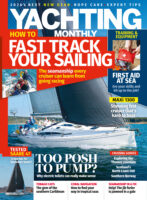The European Union could ban the use of antifouling by DIY boat owners. Help the British Coatings Federation stop this happening by taking this survey
Take the survey now: https://www.surveymonkey.com/r/NPNB6NW
A new survey has been launched to help understand how sailors use antifouling paint on their yachts. The data is urgently needed to inform policy makers who are considering resitricting the use of biocide substances, which could lead to a ban on the DIY application of antifoul.
The British Coating Federation (BCF), the national trade association for paint and ink manufacturers in the UK, is asking boat owners to tell them how they use antifouling on their boats to build a better picture of this routine maintenance task.
Questions include how sailors apply antifouling, how often they do it, what protective equipment they use, and what they do if they are exposed to the paint.
Trevor Fielding, regulatory affairs manager at BCF, explained: ‘Biocides, which make antifouling paints work, are currently being reviewed under the Biocidal Products Regulation (BPR). The review process is well under way and is one of the most rigorous assessments of antifouling active substances and paints to date.’
‘A possible outcome may be the introduction of restrictions on the use of antifouling paints, for example, limiting their use to professional users only, and potentially banning their sale to the general public,’ he said.
The BCF is also concerned that existing products may have difficulty passing through the registration process due to the hazardous nature of biocides. ‘This raises concerns that product performance – how well the product controls fouling – could be detrimentally affected,’ Mr Fielding said.
 The biocides in antifouling are potentially harmful to humans and exposure includes inhalation of fumes or dust from sanding, and paint splashes. These risks can largely be mitigated with proper protective gear.
The biocides in antifouling are potentially harmful to humans and exposure includes inhalation of fumes or dust from sanding, and paint splashes. These risks can largely be mitigated with proper protective gear.
Marine surveyor Ben Sutcliffe was not surprised by the review of legislation. ‘I’m sure the majority of sailors are sensible in how they handle antifouling paint, but some people don’t understand how dangerous these products can be,’ he said. ‘Dry sanding the bottom of your boat for example, puts dust into the air which can be inhaled as well as causing damage to other boats.’
Geoff Mackrill, managing director of paint manufacturer Teamac, was more optimistic: ‘Saying that people can’t be trusted to use a product simply because it entails some risks is ludicrous,’ he told YM. ‘Sailors are intelligent people who look after their own safety. If DIY application of antifouling were banned, it could put maintenance, and the hobby of sailing, out of reach of many sailors.’
The impact biocidal antifouling has on the environment is part of the legislative review, although Didier Leroy, technical director at CEPE (European Council of the Paint, Printing Ink and Artists’ Colours Industry) argues that on balance, it’s good for the environment. ‘Antifouling brings two major benefits: reduction of fuel consumption and environmental protection by the limitation of invasive species.’
RYA cruising manager Stuart Carruthers concurred. ‘Legislators are keen to regulate the use of antifouling paint from a health and safety point of view, but yachts and shipping are also seen as vectors for the spread of invasive species,’ he said. ‘Banning or weakening antifouling paint would undermine efforts to combat these threats.’
The BCF estimates that any legislation would take several years to be approved.
‘We really need to make sure that anyone applying their own antifouling fully understands the risks and warnings on the data sheet of the product they are about to apply,’ said Mr Sutcliffe. ‘If we don’t, we can expect greater regulation.’
‘We believe antifouling paints have been used safely and effectively by experienced DIY yachtsmen for years; we now need help to prove this so you can keep doing so,’ said Mr Fielding.
Take the survey now: https://www.surveymonkey.com/r/NPNB6NW





